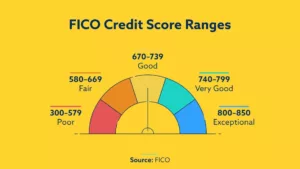Credit Builder Loans Key Takeaways
Establish a Positive Payment History: The most important factor in your credit score is your payment history. Credit builder loans report your on-time payments to the credit bureaus, demonstrating positive financial behavior and improving your credit over time.
No Hard Credit Check Required: Many lenders offering credit builder loans don’t perform hard credit inquiries, which can temporarily lower your credit score. This makes them accessible to those with damaged credit.
Build Savings: When you finish paying off the credit builder loan, you get the funds back, often with some earned interest. This creates a forced savings mechanism that can be helpful down the road.
If you’re looking to establish credit for the first time or repair a damaged credit score, a credit-builder loan may be a helpful option to consider.
What Is A Credit-Builder Loan
Credit-builder loans are specifically designed to help people with limited credit history or poor credit scores establish or improve their creditworthiness by making regular payments over a set period of time. Credit-builder loans can demonstrate responsible payment history which is a major factor in calculating your credit scores.
5 Benefits of Credit-Builder Loans
Whether you need to build credit from scratch or rebuild your credit history, credit-builder loans offer several benefits:
- Build your credit history. Making a series of on-time payments is one of the best ways to improve your credit score.
- Easy approval.The most common requirements for a credit-builder loan are being at least 18 years old, having a valid bank account and having enough income to make monthly payments.
- Apply for the loan: The application will require some personal and financial information like your address, income, employment status and housing status.
- Payments reported to the credit bureaus. Your lender will report the details of your payment to the three major credit bureaus every month.
- Cash out when it’s over. When the loan is paid off, you get the full amount of the savings account balance or Certificate of Deposit (CD) plus interest.
How Credit-Builder Loans Work
Credit-builder loans are available even if you have no credit or bad credit. There are a few things you should know before adding a credit-builder loan to your credit profile:
- Credit-builder loans are very similar to a secured credit card in that collateral is required.
- Borrowers must put an amount of money into a savings account or certificate of deposit at a bank, credit union or online lender.
- Fixed monthly payments are required until the loan is paid back.
- Payment history is reported to the credit bureaus.
- On-time payments are necessary to help build or rebuild credit.
- This is a real loan, even though it is secured. That means LATE payments will be reported to the credit bureaus as well.
- Once the loan is paid in full, you’ll have access to the money.
- Sometimes, a small amount of interest is earned on the deposited money used as collateral.
Where to Get a Credit-Builder Loan
Credit-builder loans are typically offered by the following three financial institutions:
Credit Unions
Credit-builder loans are likely to be found at credit unions. You’ll have to join the credit union by meeting its membership criteria such as living or working in a certain geographic area or y making a small donation, typically not more than $5 to $10 to a partner charity. The National Credit Union Administration has a search tool to locate a credit union near you.
Here is how credit unions typically grant credit-builder loans:
- The credit union grants a loan for a certain amount — let’s say $3,000. No up-front money would be necessary. But the credit union would not actually give you the money. The money would be frozen in an interest-bearing savings account in your name.
- You would then make the payments; with interest, until the $3,000 loan is paid off. At the time of payoff you would then get the money, along with whatever dividends have been earned on the savings deposit. Borrowers have an excellent chance to build a positive credit history if payments are made on time.
Community banks
Community banks play an important role in the communities they serve, providing access to financial services. They are often more flexible in their lending practices and offer financial products, like credit-builder loans to customers who may not qualify for traditional loans. Banklocally provides a search tool to find community banks near you.
Online lenders
Self Lender is a financial technology company that offers a online credit-builder accounts. Borrowers make monthly payments into a savings account, which is then reported to the credit bureaus as a loan payment. At the end of the account term, typically 12 or 24 months, the borrower receives the total amount paid into the account, minus interest and fees. Credit-builder repayment plans start at $25 per month.
How Credit-Builder Loans Help Build Credit?
Credit-builder loans are an excellent option for building credit if you don’t have any credit accounts or repairing credit if you have negative marks on your credit report, such as missed payments.
Making timely payments demonstrates to lenders that you can handle additional credit lines in the future and be viewed as a trustworthy borrower. Payment history is the most significant component of your FICO® Score☉, accounting for 35%.
Alternate Credit-Builder Option
Credit Builder Virtual Card
 The StellarFi Virtual Card isn’t like credit cards, it builds your credit history by reporting everyday bill payments, like your phone bill, rent, gym membership, and favorite streaming service, to Equifax and Experian as on-time payments. Most of your bill payments go unreported to the credit bureaus because they are not made on loans or credit cards. StellarFI reports bill payments made through StellarFi directly to the credit bureaus similar to a line of credit. Here is how it works:
The StellarFi Virtual Card isn’t like credit cards, it builds your credit history by reporting everyday bill payments, like your phone bill, rent, gym membership, and favorite streaming service, to Equifax and Experian as on-time payments. Most of your bill payments go unreported to the credit bureaus because they are not made on loans or credit cards. StellarFI reports bill payments made through StellarFi directly to the credit bureaus similar to a line of credit. Here is how it works:
- Connect a bank account that you normally use to pay your bills.
- Choose the bills that you want to pay through StellarFi and link them in the dashboard.
- When the due date arrives for a bill, or when you want to manually pay a bill, we check to see if your bank account balance is sufficient to cover the amount of the linked bill.
- If your account balance is sufficient, StellarFi pays your bill.
- At the same time, you’ll automatically authorize a debit from your connected bank account for the amount of the bill.
- At least once a month, StellarFi batch reports your StellarFi Limit (which is based on the dollar amount of bills you’ve paid through StellarFi) to all major credit bureaus.
StellarFi has two monthly plan options for their service:
- Lite $4.99/monthly
- Prime $9.99/monthly
The fee is charged the same day you enroll and will subsequently be charged on the same day each month thereafter, until cancelled.
Authorized-user credit
Another option to improve your credit is to request a friend or family member with excellent credit to add you as an authorized user on their credit card. By being added as an authorized user, the credit history of the card is added to your credit report.
It’s not necessary for the primary user to give you the card, and you don’t need to make any charges on the card. Being associated with the primary user’s positive credit history can have a positive impact on your credit history.
When Not to Get a Credit-Builder Loan
If you need funds from a loan right away, you’ll likely have to opt for traditional personal loan. This type of loan doesn’t require any collateral, and the lender reviews your credit history, credit score and employment, among other criteria to make a decision.
However, if your credit score is poor or you have a limited credit history, you’ll likely be subject to higher interest rates.


















